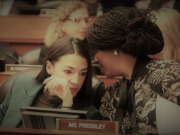A little-noticed, but interesting op-ed from Public Citizen lobbyist Craig Holman appeared in The Washington Post recently advocating for tax-financed campaigns in Washington D.C. city elections. In his op-ed, Holman appears to take the unusual position that these programs are beneficial because they do not affect the outcome of races:
For incumbent elected officials, the news is good here, too. Though small-donor public financing programs fundamentally change the donor base and increase the competitiveness of elections, these programs have not been shown to measurably increase the odds of incumbents being defeated at the polls. Incumbents, like newcomers to politics, share the benefits of changing donor pools from the wealthy special interests to average citizens.
Huh? How exactly are these programs “increasing competitiveness” if they do not “increase the odds of incumbents being defeated”? And more to the point, why is that something that taxpayers want to subsidize? The logic appears to be that incumbent politicians will be re-elected with a smaller percentage of the vote, and therefore, it’s a good idea to pay for part of their campaign – and their opponents’ – with taxpayers dollars. But who cares what the margin of victory is if the outcome is ultimately the same? If incumbents can rest easy that new “competition” created by tax-financing programs won’t jeopardize their seat, there is no motivation to behave any differently in office.
Holman is at least correct to say that tax-financed campaigns help incumbents. As we have said many times before, by nearly any metric, the same kind of politicians (or literally the same politicians) are elected under tax-financing schemes, and act, for better or worse, just like those who raised funds the traditional way (through voluntary donations from those who support their campaign and their message). Under tax-financing systems, the number of women elected does not increase, legislatures are still comprised predominantly of lawyers and businessmen, legislators’ voting records align with organized interests at the same rate, and lobbying continues unfettered. And perhaps most disappointing, corrupt politicians continue to be corrupt – tax-financed campaigns become just another avenue for these bad actors to abuse the public.
One would expect these facts to be highlighted in a critique of tax-financing proposals, but why would Holman, a strong advocate for these systems, bring them to light? The answer, of course, is that the people Holman needs to change the law are the very same that succeeded under the system he wants to replace – the thirteen, already elected, members of the D.C. City Council. To win their support, he lets them in on the secret that this supposedly powerful “reform” will actually leave most things as they are.
This is a problem that extends far beyond D.C.’s consideration of tax-financing programs: Since incumbent politicians must craft any new tax-financed system, they will inevitably bake their incumbency advantage into any new law. Regulatory capture is a fact of life, and Holman’s op-ed is a tacit admission that “reformers” know it too.
To be fair, Holman makes other arguments in support of matching funds. Such a program, he says, will “amplify the voices of average citizens” (funny how contributions are “voices” when it comes to “average citizens”) and make “voters pay more attention to races lower down on the ballot” (a debatable claim in itself, as the evidence shows no increase in voter turnout under these systems). But he gives the game away with the title, “There’s nothing to fear in fair elections.” The only people who would fear “fair elections,” after all, are those already in power.
This pandering to incumbents ends up undermining the fundamental argument the pro-regulation lobby makes in support of tax-financing. The debate over any tax-financed program hinges on a pretty basic cost/benefit analysis, where the cost is millions of tax dollars to subsidize campaigns, and the (alleged) benefits are euphemistic promises of “greater representation” and “better politicians more responsive to the will of the people.” Holman and his allies are admitting that such programs have no effect on incumbency – that, at the end of the day, we’re electing the same people regardless of whether their campaigns are privately-financed or tax-financed. If that’s the case, then those benefits simply cannot be worth the cost, especially given the myriad failures of tax-financing systems to achieve their goals.














